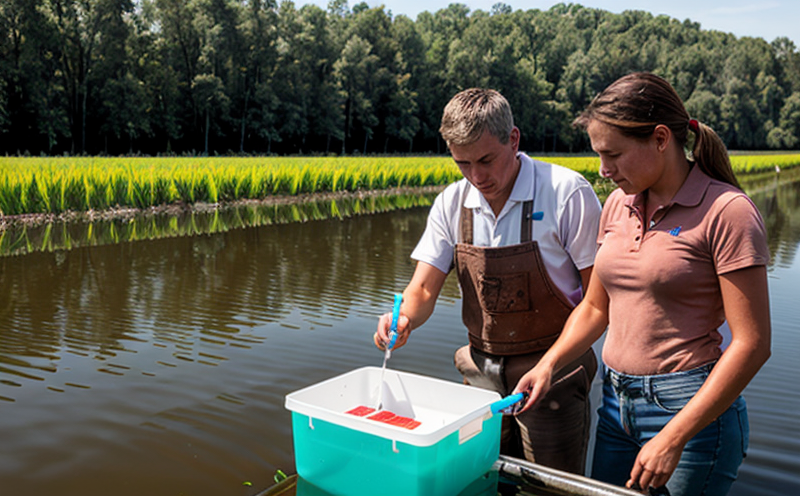Residual Chlorine Testing in Agricultural Water
In agriculture and forestry, water quality is a critical factor that significantly impacts crop yield and overall sustainability. Residual chlorine testing plays an essential role in ensuring the safety and effectiveness of water used for irrigation, animal drinking, and other agricultural applications. This service ensures that the levels of residual chlorine are within acceptable limits to prevent the growth of harmful microorganisms while maintaining the efficacy of disinfection.
Residual chlorine is a vital component of water treatment processes aimed at protecting water from contamination. In agriculture, water sources such as wells, surface water bodies, and irrigation systems often require regular testing to ensure that they are free from pathogens and other contaminants. This service involves the use of advanced analytical techniques to measure the concentration of residual chlorine in agricultural water.
The primary goal of this testing is to maintain a balance between effective disinfection and the prevention of chlorination by-products, which can be harmful if present at high concentrations. Understanding these parameters helps in optimizing the use of water resources and minimizing potential risks associated with poor quality water.
For accurate residual chlorine measurement, it's crucial to follow specific procedures. These include collecting representative samples from various points within the irrigation system or water source, preparing them for analysis using appropriate preservation methods, and then performing the actual testing in a controlled environment. The use of precise analytical instruments ensures reliable results that can be used to make informed decisions about water quality.
Understanding the role of residual chlorine is paramount when considering its impact on different types of crops. Some crops are more sensitive than others to changes in water chemistry, making it necessary to tailor the testing process accordingly. By identifying the optimal levels of residual chlorine for various applications, we can enhance crop health and productivity.
Another key aspect of this service is ensuring compliance with relevant standards and regulations. This includes adhering to guidelines set out by organizations like ISO (International Organization for Standardization), ASTM International, or national bodies responsible for water quality control. Compliance ensures that the practices used are consistent with industry best practices.
The testing process itself involves several steps from sample collection through analysis using state-of-the-art equipment. Samples must be collected at specific intervals depending on the type of application (irrigation systems, drinking water sources). Once collected, these samples go through rigorous preparation before being analyzed for residual chlorine content using spectrophotometric or colorimetric methods.
Interpreting results correctly is equally important; deviations from target values may indicate issues that need addressing. For instance, insufficient levels could lead to increased risk of contamination while excess can degrade soil quality over time. Regular monitoring allows for timely adjustments to ensure optimal conditions throughout the growing season.
In conclusion, residual chlorine testing is an indispensable tool in maintaining high standards of water quality across diverse agricultural settings. By adhering to established protocols and leveraging advanced analytical techniques, this service helps safeguard both human health and environmental sustainability.
Applied Standards
| Standard | Description |
|---|---|
| ISO 6489-1:2017 | Methods for the Determination of Free and Total Chlorine in Water - Part 1: Spectrophotometric Methods. |
| ASTM D5949-13 | Standard Practice for Sampling Drinking Water from a Distribution System for Analysis. |
Industry Applications
- Irrigation systems where water is used to supply crops with essential nutrients and water.
- Agricultural operations involving livestock that require clean drinking water for health reasons.
- Fruit orchards needing periodic chlorination treatments to protect against disease spread via contaminated irrigation water.
International Acceptance and Recognition
- This service aligns with global standards set by the World Health Organization (WHO) for safe drinking water quality.
- It is also compliant with European Union directives on water quality management in agriculture.





